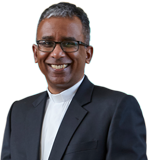3 October Homily
Tomorrow at 11am, the Archbishop will celebrate the Opening Mass of the Plenary Council. It has seemed quite a journey to this moment. It was supposed to take place last year, but covid-19 intervened.
You may have followed the developments closely or it may have seemed distant and of little interest. People have spoken about their hopes and fears. Some want everything to change; others are afraid about what change may come. The Plenary Council can lead us in new directions and can even make law for the church in Australia. There are prophets of doom saying that nothing can happen because the bishops are in control. Or that Rome has the final say. But look at Vatican II and the windows and doors it threw open, how God breathed freedom and life into the church.
People have already started politicking. It is all very human and the same sorts of things have happened through the centuries. In every council or gathering, whether of the whole catholic church or the church in one part of the world, there is politics of one kind or another. Those sort of power plays go back to the James and John asking Jesus whether they can sit at his right hand and left in the Kingdom.
To worry about power or control is very human, but is to miss something of the point. One of the things which has annoyed me (still annoys me at times) about God is his not wanting to control human beings. He cares for us, he watches over us, he provides for us, but he does not want to control us. Remember the Prodigal Son; he asks for his inheritance and the Father just gives it to him. Insanity, but God loves us into true freedom. We, humans, love and obsess about control, God and God’s Spirit does not. Who knows what God will set free through the Council.
The bishops of the church have, what is called, a deliberative vote at the Plenary Council. The other members – delegates – have a consultative vote. So as discussions proceed and eventually matters come to votes, the lay members, priests and religious will cast their vote which indicates the sense of the large part of the body. Then at some point the bishops will vote and their vote will be determinative. Eventually all decisions and laws will go to Rome for the approval of the Holy Father.
So it seems that the bishops have control, but the final vote on anything is only part of the story. The encounter, the listening is just as important. In the encounter, the discussion, the disagreement, the voice of the Spirit can be heard for those who have the freedom to hear him.
Listening to the voice of the Spirit is at the heart of the Council. If the Council is to bear fruit, true, lasting fruit, it will come from the movement of the Spirit. The Spirit is with the church, but the Spirit does not force us to listen or to obey. How does one listen to the Spirit? There is no magic formula; that is not how God works. It is not just a challenge, an invitation for the members of the Council, it is an invitation for all of us.
God cares deeply for his church, including the part of his church in Australia, but he also cares for each of us. His Spirit is with each of us, speaks to each of us, breathes freedom, if we let him, into each of us. We need to want to listen to the Spirit, a desire he can give us. The freedom to want to listen and to truly listen is not easy for us. Our wilfulness, our sinfulness, the ways we have always done things, pulls at us. Praying for the freedom of the Spirit, praying the Scriptures, listening to others as well our our thoughts, emotions and responses; being willing to ask – does this come from God and lead to God – are all part of the journey of listening to the Spirit. It is so for the Plenary Council and for each of us.
Come Holy Spirit, come Holy Spirit, fill the hearts of your faithful and kindle in them the fire of your love. Send forth your Spirit and they shall be created and you shall renew the face of the earth; you shall renew our lives and our church in Australia.

